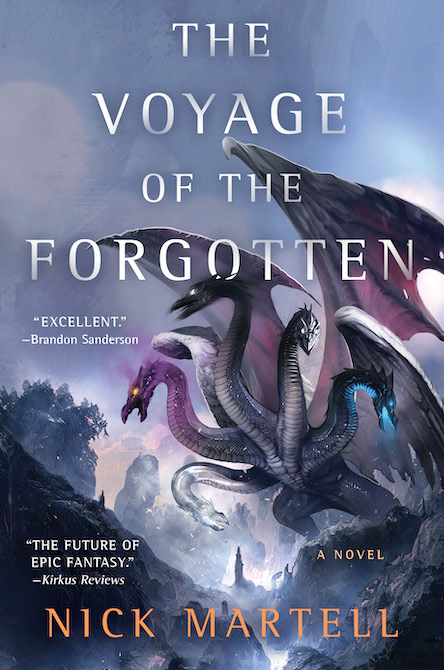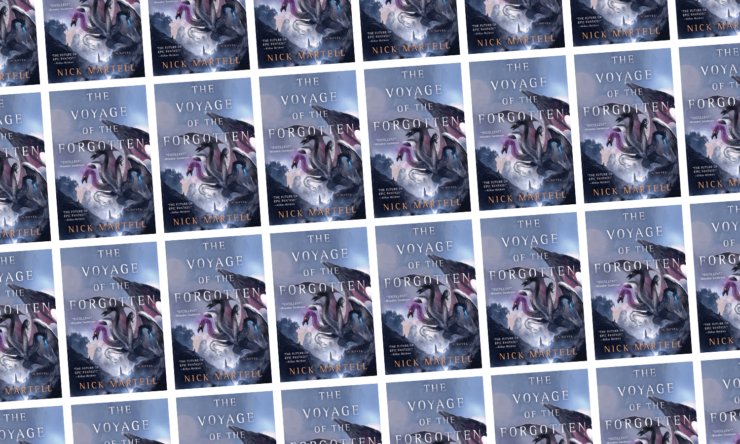Nick Martell’s The Voyage of the Forgotten brings to a close the story of Michael Kingman, a man of many epithets and a few burning and straightforward ambitions…
Michael Kingman has been through a lot, and ever since he has gone through the tribulations of trying to regain lost memories and sharp relations with Serena, the Queen of Hollow, his path has slowly become clear. It’s been a tangled story over the first two volumes, Kingdom of Liars and The Two-Faced Queen. He has regained some of his memory, or at least learned what was lost. But protecting all that he holds dear is going to require his greatest trick yet.
Come at the King, best not miss. It’s not that Michael doesn’t realize his plan to deal with his two great adversaries, Angelo and Dark, requires him to encounter and deal with the great figures not of his time, but all time—the Wolven Kings. Figures of age and power and immortality so powerful that their very names are not easily found out. For names, Michael well knows, have power.
The story of The Voyage of the Forgotten, and the entire Mercenary King trilogy, is in essence a tension between several forces—destiny and fate on the one hand, desire and want, on the second hand, and finally the inertia of power structures and those who are in command. The genius of Martell’s work is that all of these forces are tensions in and of themselves. Michael’s fate and destiny, to be a cast off Kingman, an exile, clashing with the destiny prophesied that he could cause the other moon to start to fall. Desire and Want—what Michael wants is a life with Serena, but the wants of Angelo and Dark, revealed here in this volume at last, would make Michael’s vision of life with Serena impossible.
Buy the Book


The Voyage of the Forgotten
Who is writing the story, who is telling the story, and who is the story for? In Kingdom of Liars, we are dropped right into the action and meant to sink or swim with a protagonist who has lost some of his memories, has been branded a traitor, and is living on the ragged edge. The novel’s form and structure follows the plight of Michael in that regard and it is being told from Michael’s point of view, bringing us into his world.
In The Two-Faced Queen, we get a dramatis personae, and an “opening crawl” from chronicler Symon Anderson. We soon launch back into Michael’s point of view, but the themes of history and storytelling gets thrown into explicit text. This continues in Voyage of the Forgotten. We get a Dramatis Personae once again, but it is revealed that Serena is writing it, before we launch back into Michael’s story. Given subsequent events, there is some very bitter irony to having Serena be the viewpoint for the Dramatis Personae.
“Who lives, who dies, who tells your story.” Martell has taken the themes of Hamilton to heart in this series. While the novels are in his point of view throughout, the devices seen above help extend point of view and perspective away from being mainly (not always, but mainly) in Michael’s head throughout the entire series. It helps bring perspective, and parallax to what is an epic fantasy that expands and gets bigger as the series continues and progresses, leading up to the widest canvas yet here in Voyage of the Forgotten.
Writing epic fantasy and keeping all of the balls juggling is hard, especially mainly restricting yourself, with some exceptions, to primarily a single point of view. The Mercenary King series being a widescreen epic, with Michael facing dragons, the aforementioned Wolven Kings, other immortals, and even a visit to the land of the dead. It’s a complex and complicated world, from the magic system, to the aforementioned politics to the character web and who is connected to whom. It is epic fantasy in the Sandersonian mold (and the crunchily complex and multifaceted magic system is one, but not the only hallmark of that tradition).
Some of the innovation of dealing with memory loss in the first novel as plot device, which struck me in reading Kingdom of Liars, gets transmogrified into memory loss as tragedy and driver for the plot in a different way. It is not, given the title of the book, to say that a different character than Michael, but one close to him, becomes a Forgotten, and Michael’s quest and determination (and journey, or one might say, Voyage) to find a way to reverse that (on top of his previous ambitions) drives the plot. It’s not a case of trying to recall lost memories, but to restore what was lost. But it does bring home the theme of memory loss, and what we do when we cannot remember who we are and what we are to people and what one CAN do with one’s past unmoored. Michael Kingman does follow Kuato of Total Recall’s maxim.
The action here in this final volume, which scales up the stakes and size of encounters from the first two novels, works rather well. One may not be surprised that Michael, whenever confronted with ever larger battles, resolutely refuses to play the game by the rules expected. This is a case where how a character approaches combat as a window into their character. Michael likes to cheat. The best example of this in the novel is a sequence where Michael, expected to run a deadly gauntlet, takes an unexpected third option. One might even say that “take a third option” is the modus operandi that Michael does in this entire series, both in and out of combat. Michael’s entire gambit to conclude this volume epitomizes this approach.
But one of the abiding things that The Voyage of the Forgotten makes clear, and makes the entire series clear, is that ultimately, Michael Kingman’s story is a tragedy. I got that sense in the first volume, and while there might have been a false dawn of hope in spots, this third volume brings it home. Michael’s end is not going to be a happily ever after, that has never been in the cards. But there is beauty in the struggle, and in the fight, and in Michael’s efforts, there is solid fantasy writing. Time and again, Michael is told that his course of action will lead to ruin, sometimes in dread prophecy, sometimes in the hardbitten promises of the dangerous people Michael faces. And yet, Michael keeps striving. against impossible odds. (See the title of this piece after all). But it is a lot of shades of grey in what Michael does and what Michael faces.
So, is The Voyage of the Forgotten, and thus the entire series, Grimdark, then? The obsession on what makes a fantasy novel grimdark or not and the omnipresence of grimdark as the major mode of fantasy seems to have receded as a major discussion in the fantasy circles I am involved in. But a fair amount, perhaps the greater part of epic fantasy being written today, could be classified as varying shades of grey in that grimdark mode. Michael is a character who is no hero, in a world of a lot of bad choices and no clear good and evil, doing the best he can for his goals. He does, throughout this volume and the previous too, ask himself (and the reader) whether or not if he is a villain and not a hero. That does suggest a nuance beyond much of the archetype (if not outright subversion of the usual tropes of Grimdark).
As I was reading this book and thinking on this series, especially in this last volume, what came most to mind is R.S. Ford’s War of the Archon series. That book has a far more military bent than this one, to be sure, but near-immortal beings pushing characters around, and lots of no-good choices and information control (including memory loss) being used to push characters in different directions gave me resonances as I read the book. Strange and unusual magic with difficult costs also tie the two series. The bigger and larger battles and encounters in this last Mercenary King novel as compared to the first two also reminded me of the more epic encounters to be found in Ford’s series as well. And to be clear, Ford’s novels are unapologetically grimdark.
It is clear that Martell has talent as a storyteller, as a creator of worlds and characters. With Michael’s story complete, I look forward to Martell’s next world.
The Voyage of the Forgotten is published by Gallery/Saga Press.
Read an excerpt here.
An ex-pat New Yorker living in Minnesota, Paul Weimer has been reading sci-fi and fantasy for over 30 years. An avid and enthusiastic amateur photographer, blogger and podcaster, Paul primarily contributes to the Skiffy and Fanty Show as blogger and podcaster, and the SFF Audio podcast. If you’ve spent any time reading about SFF online, you’ve probably read one of his blog comments or tweets (he’s @PrinceJvstin).










